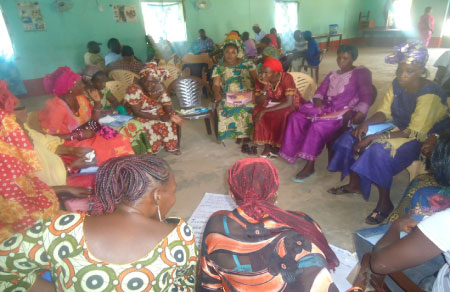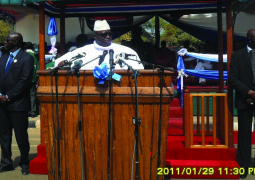
“The attainment of Millennium Development Goal 3 - poverty reduction - can only be achieved through increased participation of women in decision-making processes,” Mr Sonko said at a four-day training for women politicians and political party representatives, a program supported by UNDEF and jointly implemented by FAWEGAM, Pro-Hope International and WANEP-Gambia, at Jenoi Lower River Region.
To him, women’s equal participation in decision-making is not only a demand for simple justice or democracy but can also be seen as a necessary condition for women’s interests to be taken into account, according towomen’s political participation and representation at decision-making levels are two different issues.
In The Gambia women constitute 58% of voters and exercise their franchise during elections. In the 2012 elections for the National Assembly of 53 members, only 2 women were elected through the ballot box, 1 was returned unopposed and 2 were nominated (Electoral Report 2012).
Female representation in the National Assembly is at less than 10% and falls far below the 50% and 30% recommended by the Inter-Parliamentary Union and the Convention on the Elimination of all forms of Discrimination Against Women (CEDAW).
At national level, the 1997 Constitution of The Gambia has clauses which support the participation of women in decision-making in public and political life.
Section 28 (2) states: “Women shall have the right to equal treatment with men, including equal opportunities in political, economic and social activities,” he added.
Dr Alieu B.S. Taal, senior lecturer at the UTG, spoke on man/women and state of nature and creation of human society, the political community or state.
He further placed emphasis on the concept of sovereignty and human rights and democracy and good governance.
To him, good governance is the process of decision-making and the process by which decisions are implemented, an analysis of governance focuses on the formal and informal actors involved in decision-making and implementing the decisions made and the formal and informal structures that have been set in place to arrive at and implement the decision.
Government is one of the actors in governance and some of the actors involved in governance vary depending on the level of governance that is under discussion.
Sulayman Joof spoke at length on the significance of both men and women saying their participation in the democratization processes is a key cornerstone of good governance.
This, he said, could be either direct or through legitimate intermediate institutions or representatives.
He said the rule of law and good governance requires fair legal frameworks that are enforced impartially and this requires full protection of human rights, particularly those of minorities.
“Impartial enforcement of laws requires an independent judiciary and an impartial and incorruptible police force,” he added.
Accountability is a key requirement of good governance, not only governmental institutions but also the private sector and civil society organizations must be accountable to the public and to their institutional stakeholders.
Who is accountable to who varies depending on whether decisions or actions taken are internal or external to an organization or institution.
In general an organization or an institution is accountable to those who will be affected by its decisions or actions.
Accountability cannot be enforced without transparency and the rule of law.
Haruna Kuyateh, WANEP focal point for NBR, talked about the importance of networking and partnership for effective and efficient implementation of strategies and policies for women advancement.
There is a big gap between men and women in terms of equal opportunities.
According to him, research has shown that women participate in decision-making processes and urged political parties and parties’ selection committees to give chances to women aspiring candidates to be part of the decision-making processes.
Musa Sanneh of URR said there was preparatory stage, feasibility survey across the country to know the reality on the ground for gender variety, adding that for the women to achieve their goal requires an intensive and uninterrupted sensitization because of the mindset of the people, regarding religious, traditional and cultural beliefs.


